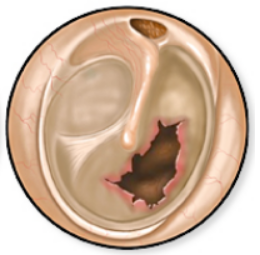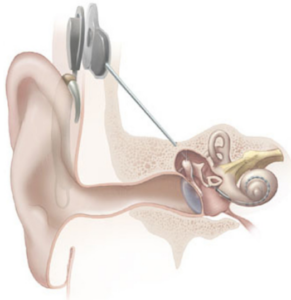Hearing loss can be a difficult and isolating experience, and many people wonder if surgery might be the answer to restore their hearing. At the Dallas Ear Institute, we’re frequently asked, “Can I have surgery to improve my hearing like my neighbor did?” The short answer is: it depends on the type of hearing loss you have.
In this article, we’ll explore the different types of hearing loss, the potential for surgical treatment, and when hearing aids may be the best option.
Types of Hearing Loss
To understand if surgery could help your hearing, it’s essential to first understand
Sensorineural Hearing Loss: The most common type, usually resulting from damage to the cochlea (the inner ear’s hearing organ). This type of hearing loss is often associated with aging, noise exposure, or other less common causes.
Conductive Hearing Loss: This occurs when sound waves cannot reach the inner ear due to an obstruction or issue in the middle ear or outer ear. Conductive hearing loss may involve problems with the eardrum or ossicles (hearing bones).
Mixed Hearing Loss: A combination of both sensorineural and conductive hearing loss.
Each type requires a different approach. Let’s dive into the treatment options for each category.
Treatment for Sensorineural Hearing Loss
Hearing Aids: For the
Function of Hearing Aids: Hearing aids amplify sound, compensating for the cochlea’s decreased function.
Advancements in Technology: Modern hearing aids are smaller, with longer battery life, and advanced programming for a more natural hearing experience. While this may disappoint those hoping for a surgical fix, hearing aids are a highly effective solution that can significantly improve quality of life.
When Surgery May Be an Option: Conductive and Mixed Hearing Loss
In cases of conductive hearing loss, surgery is often possible and may be highly effective. Conductive hearing loss can occur due to structural problems that prevent sound from reaching the inner ear. Here’s how surgery can help:
Addressing Eardrum Damage: If there’s a hole in the eardrum, a procedure called tympanoplasty can repair it.
Repairing the Hearing Bones: If the ossicles (tiny bones in the middle ear) are damaged, an ossiculoplasty or stapedectomy can repair or replace the bones, improving sound transmission to the inner ear. By fixing these structural issues, an ear surgeon can restore the path for sound to reach the inner ear, allowing for more natural hearing.
Understanding the Hearing Test: Identifying the Type of Hearing Loss
To determine if surgery
Assessing Air-Bone Gap: The hearing test measures the gap between what you can hear day-to-day (air conduction) and what your inner ear could potentially hear if sound reached it without blockage (bone conduction).
Diagnostic Imaging: In addition to the hearing test, the neurotologist (ear surgeon) will likely order a CT scan or MRI to assess the ear’s structure.
By analyzing both test results and imaging, your ear surgeon can confirm whether surgery could improve your hearing.
Surgery for Inner Ear Issues: Rare But Possible
In some rare cases, patients with severe sensorineural hearing loss may be candidates for specific surgeries:
Cochlear Implants: For individuals with profound sensorineural hearing loss who don’t respond to hearing aids, a cochlear implant can restore hearing by directly stimulating the cochlear nerve.
Superior Canal Dehiscence Repair: When a hole is present in the inner ear (known as superior canal dehiscence), it can cause sound distortion and balance issues, which can be corrected surgically. However, these procedures are not typical for most sensorineural hearing loss cases and are usually reserved for specific conditions.
Adjusting Expectations: The Benefits of Hearing Aids
For those who may feel discouraged at the thought of relying on hearing aids rather than surgery, it’s helpful to look at the bright side:
Advanced Features: Today’s hearing aids offer customizable settings, directional microphones, and noise reduction features, providing a more seamless listening experience.
Discrete and Convenient: Hearing aids have become more compact and less visible, with longer-lasting batteries and easier controls. Choosing hearing aids can be empowering, as they offer significant hearing improvement without the need for surgery.
The Dallas Ear Institute’s Commitment to Better Hearing
At Dallas Ear Institute, our goal is to find the best solution for every patient. Whether through surgery to repair structural issues or hearing aids to amplify sound, we’re dedicated to helping you find the right path to better hearing.

Reviewed by the board-certified ENTs doctors at Dallas Ear
Still have questions? Ask one of our ENT doctors!


